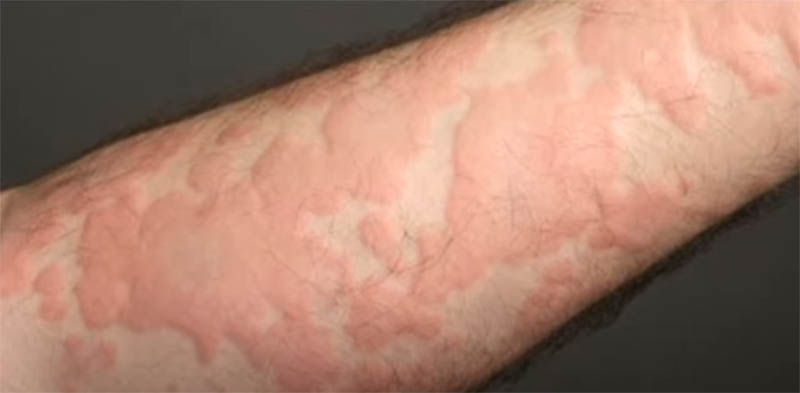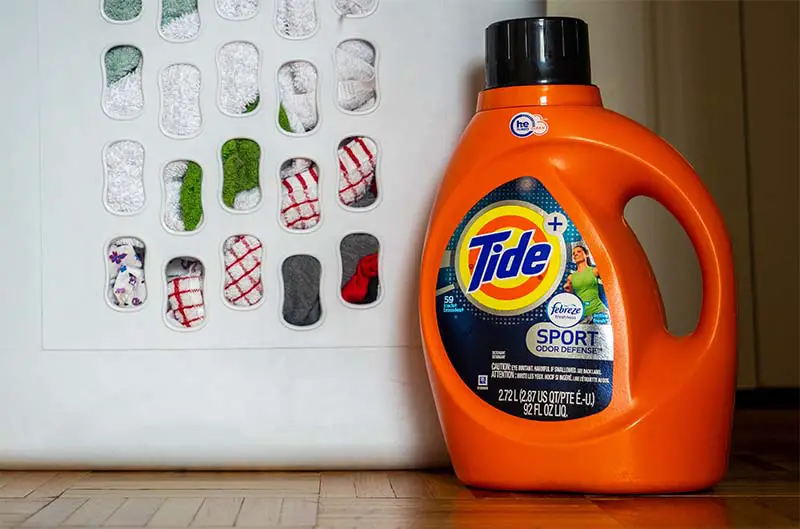The primary purpose of laundry detergent is to wash clothes, but it can also come in handy for different cleaning roles around the house. Apart from that laundry detergents are of variant fragrances and a blend of chemicals that may cause allergic reactions. How long does an allergic reaction to laundry detergent last?
If you avoid the offending substance, allergic reactions to laundry detergent can last for two, three, or four weeks. Sensitivity comes after the direct contact with an allergenic substance your body responds to. As a result, an itchy red rash called contact dermatitis develops, but it’s not contagious.
Contact dermatitis results from allergic reactions to cosmetics, fragrances, soaps, or plants. Although it’s not a life-threatening condition, discomfort and itchiness are inevitable. You can use anti-itch creams, wet compressing, or soothing lotion to reduce the harshness.
Can laundry detergent cause hives
Hives are acute problems that arise when you encounter an irritant. They’re red or pink welts that can go away without medication or clear them using allergy medications like antihistamines. Once you have an allergic reaction, the body responds by releasing histamines, a chemical that helps fight intruders and prevent infections.
As a result, the histamines cause swelling and itchiness, which is the case with hives. Besides allergies, hives can also be because of stress, wearing tight clothes, infections, exercise, or extreme weather (cold, hot).
Who is at the risk of hives? People prone to allergies will most likely get hives. If under medication, you can be exposed to allergic substances unknowingly, or those who already have a health condition are more vulnerable to hives.

All detergent allergy
Detergent allergy is common in hidden areas like armpits and groin and can affect children and adults. Sensitivity to laundry detergent happens after the first or multiple exposures. However, try fragrance or dye-free detergents if you’re sensitive to laundry detergents.
Causes of detergent allergies
Laundry detergents are effective because they blend multiple chemicals, which can cause allergic reactions in some of you.
Allergens
Laundry detergents contain surfactants, a cleaning agent that loosens dirt and separates oil particles to make them easy to wash away. Surfactants can be harsh to susceptible skin, causing irritation or allergic reactions.
Another allergic trigger is artificial fragrances which manufacturers use for detergents to have nice scents. Therefore, it might be difficult to know what you’re reacting to. Mild allergens in laundry detergents work slowly to develop allergic reactions through multiple exposures. Common allergens in detergents are;
Allergic reaction to all free and clear detergent
What is free & clear laundry detergent? Free and clear detergents have no irritants like dyes, fabric softeners, fragrances, or bleach. If a product is clear and free, it’s ideal for sensitive skin.
The chemicals in regular detergents leave residue in clothes after washing, no matter how often you rinse them. Therefore, wearing tight-fitting clothes means they’re in direct contact with your skin, hence there remain higher chances of allergic reactions.
If you have sensitive skin, you need the free & clear detergent for all washing to avoid exposure to allergens. However, some free and clear detergents have the oxi ingredient, which improves stain removal power. But these have been reported to cause severe allergic reactions like hives.
Tide detergent allergy

Tide detergent is a famous brand that different customers have reported allergic reactions after using it. Most customers claim to have itching, hives, and a red rash after wearing clothes washed with the detergent. After washing clothes with tide detergent and rinsing them severally, the smell doesn’t disappear, meaning it clings to the fabric.
Wearing clothes that smell of tide detergent is a surefire to developing hives or a red, itchy rash that can be uncomfortable. Now You may wonder, how long does a laundry detergent rash last? Depending on the allergy level, it can last between two to four weeks. You can try to add white vinegar to break down the harsh chemicals and see if they will react differently.
Alternatively, changing the detergent immediately or rewashing clothes can heal the rash in three days. However, if you become intolerable with tide detergent, it’s best to stop using it and if the inflammation persists, seek medical advice.
Purex laundry detergent skin rash is not the only risk you’ll be facing, but there maybe also other health conditions like asthma. The detergent contains perfumes and harsh chemicals that can lead to various adverse reactions, including disease symptoms like difficulty breathing.
Discontinuing the use of this product is the first step toward healing or worsening the allergic reaction to detergent rash.
How do you know if you’re allergic to laundry detergents?

The symptoms of allergic reaction to laundry detergent are akin to contact dermatitis. And these signs include:
- Red skin because of irritation
- Severe itching resulting in a red rash
- Swelling in the affected area or bumps
- Hot skin in the affected areas
- Painful skin to touch
- Blisters that may ooze at times
- Dry, cracked, scaly skin
- Swelling, burning, or tenderness
How do you get rid of an allergic reaction fast?
Once you determine your allergy to laundry detergents, it’s easy to manage the condition at home by avoiding allergenic products. Begin by changing your laundry detergent and watch to see whether the symptoms are evident. The solutions mentioned below can help reduce symptoms and, if not, visit a doctor.
- Take an oatmeal bath to soothe the affected areas
- Use cool water to wash affected areas using fragrance-free soap
- Now, rinse off your skin thoroughly
- Then, dry your skin by patting, not rubbing, to avoid further irritation
- Get over-the-counter creams
- Avoid tight-fitting clothes
- Finally, rewash newly washed clothes in plain water
When to seek medical advice

Allergies to laundry detergents can manifest in a few hours or even after ten days of exposure. An immediate allergic reaction helps identify the trigger, but in 10 days, you might be unsure what you’re reacting to. However, if you have the symptoms below, visit a doctor for help.
- An extensive rash that’s uncomfortable and distracts you from daily activities
- A sudden, painful rash that spreads fast in hidden areas like armpits
- Embarrassed by the appearance of your skin
- If the rash doesn’t clear in three to four weeks
- The inflammation is on your face or genitals
Laundry detergent rash treatment
Once your diagnosis points to laundry detergent allergies, here are home remedies. Constant scratching is uncomfortable and may lead to broken skin and inflammation. However, the treatments below will help cool it off.
Cold Compress
Use a bag of ice or a cloth soaked in cold water and place it on the affected area. Hold it till the itchiness or pain recedes. Calming the affected skin limits blood flow, easing and relieving the pain instantly.
Oatmeal Bath
Use colloidal oats (not those for breakfast) to take a bath. It’s an old-school method that works wonders. Oat oil contains anti-oxidant and anti-inflammatory goodness that can help clear the rash. Prepare a warm bath, add a cup of colloidal oats, soak in for half an hour, and then rinse off in a cool shower.
Coconut Oil

Coconut oil comes in handy in curing rashes. Use virgin coconut oil as it contains antibacterial and anti-inflammatory properties. Clean the inflamed areas, then apply coconut oil to hold moisture and heal the inflammation.
Over-the-counter treatment (OTC)
We don’t recommend OTC treatment, but in this case, it’s okay. Go to the nearest pharmacy and get a soothing cream for the rash.
It may come as an ointment, cream, or lotion to apply to the affected area according to your pharmacist’s guidelines. Moisturizing inflamed skin can cure the rash and replenish dry skin, resulting from laundry detergent breaking down natural oils.
Aloe Vera

Aloe Vera is a remedy for many issues, including allergies, and some health professionals recommend clearing rashes. The old-school herb soothes irritation and pain. Wash the affected area, let it dry, and then apply aloe Vera as a moisturizer.
Allergy free detergent
Some laundry detergents may cause your skin to itch and develop rashes if you have sensitive skin. This is because the ingredients that make some laundry detergents contain allergens, which your skin can respond to, resulting in itchiness. They include enzymes, preservatives, and perfumes, among others.
However, hypoallergenic laundry detergents, also known as non-biological detergents, are free of allergens. Hypo is a term that describes minor or little, meaning the detergents have fewer allergens. And people with sensitive skin can use them without fear.
Besides the fewer allergens, hypoallergenic detergents still clean your clothes like regular options. However, you must wash clothes at higher temperatures or pre-treat them before laundering.
Benefits of using hypoallergenic detergents
Natural alternatives replace chemical products with the hope of a better life with fewer problems. Here is the list of benefits you get when using hypoallergenic detergents.
Safe for Babies
A baby’s skin is sensitive to irritants, explaining why allergenic-free detergents are safe for washing clothes. Choosing hypoallergenic detergents over regular detergents will keep your baby healthy, and you’ll be free of worry.
Ideal for sensitive and dry skin
Typical laundry detergents comprise harsh chemicals that can worsen conditions like eczema, psoriasis, and dry skin. Don’t slather your sensitive or dry skin with any detergent. Instead, use allergy-free detergents and keep your skin healthy. Changing detergent might solve your dry, sensitive skin.
Environment Friendly
Hypoallergenic detergents are not only good for sensitive or dry skin but also for the environment. Using allergy-free detergents means you’ll not be releasing toxins into the air, water, or environment.
Skin reaction from laundry detergent
The irritation from laundry detergent causes a skin reaction called contact dermatitis. It manifests through an itchy, red rash that leaves your skin looking dry and scaly.
The rash may be all over the body or in confined areas like the armpits and groin. In severe cases, contact dermatitis may cause fever. The rash spreads all over your face, so it’s imperative to seek medical attention in such situations.
Although contact dermatitis clears, the red, itchy areas are unpleasant and uncomfortable. Once you change your current detergent, these symptoms should subside.
You can help calm the affected areas by washing with cool water and mild soap to remove the irritant. Apply petroleum jelly to soothe and moisturize the skin.
Prevention of allergic reactions from laundry detergents
Allergic reactions to laundry detergents can happen immediately after using a product or after several exposures. However, if diagnosis point to laundry detergent as the cause of your allergic reactions, find an alternative and see if the allergy clears. You can also exercise these precautions to avoid falling victim to the same.
- Keep off irritants and allergens – Be careful not to use products that trigger allergic reactions.
- Use cool plain water to wash irritated skin – Washing irritated skin immediately will cool it and avoid further damage. Use a gentle soap free of fragrances and cold water, rinse off thoroughly, pat dry the area, and apply petroleum jelly.
- Wear protective gear – Each time you’re handling irritating substances, use face masks, goggles, and gloves to avoid irritation.
- Apply an iron-on patch – When wearing clothes with metal fasteners, apply an iron cover to prevent direct contact with the skin.
- Use moisturizer – Regular use of moisturizing lotions helps keep your skin supple.
Frequently Asked Questions (FAQs)
What does an allergic reaction to laundry detergent feel like?
An allergic reaction to laundry detergent is itchy and uncomfortable, and constant scratching leads to skin redness, swelling, or blisters. The rash mainly affects areas where your skin is in direct contact with clothes, like behind the knees, armpits, and groin.
How long does an allergic reaction to laundry detergent last?
An allergic reaction to laundry detergent lasts for two to four weeks. However, if the irritation is instant after exposure to laundry detergent, it can go away in three days—immediately discontinuing the offending product.
How do you get rid of contact dermatitis fast?
Contact dermatitis is usually not severe and may not require medical attention. Discontinuing the use of the offending substance should bring reprieve to the symptoms.
What are the symptoms of detergent allergy?
Detergent allergy symptoms include a red itchy rash, skin bumps, swelling, scaly skin, and burning. It can turn severe, especially in confined areas like the armpits and groin, because they come into direct contact with clothes.
Can I suddenly become allergic to my laundry detergent?
Yes, you can have sudden reactions to a laundry detergent anytime. Therefore, if your regular laundry detergent suddenly irritates your skin, it’s time to switch your laundry detergent.
Conclusion
Hopefully, the question of how long an allergic reaction to laundry detergent lasts is answered sufficiently. You know laundry detergent irritates the skin because of chemicals like surfactants, preservatives, dyes, fabric softeners, and parabens it contains.
Allergic reactions can happen with the first or several exposures to a laundry detergent. And the best way to treat an allergic rash is to first wash the affected area with cool water and gentle soap, then apply petroleum jelly to moisturize the skin.
You can learn more can you is laundry detergent an acid or base?
